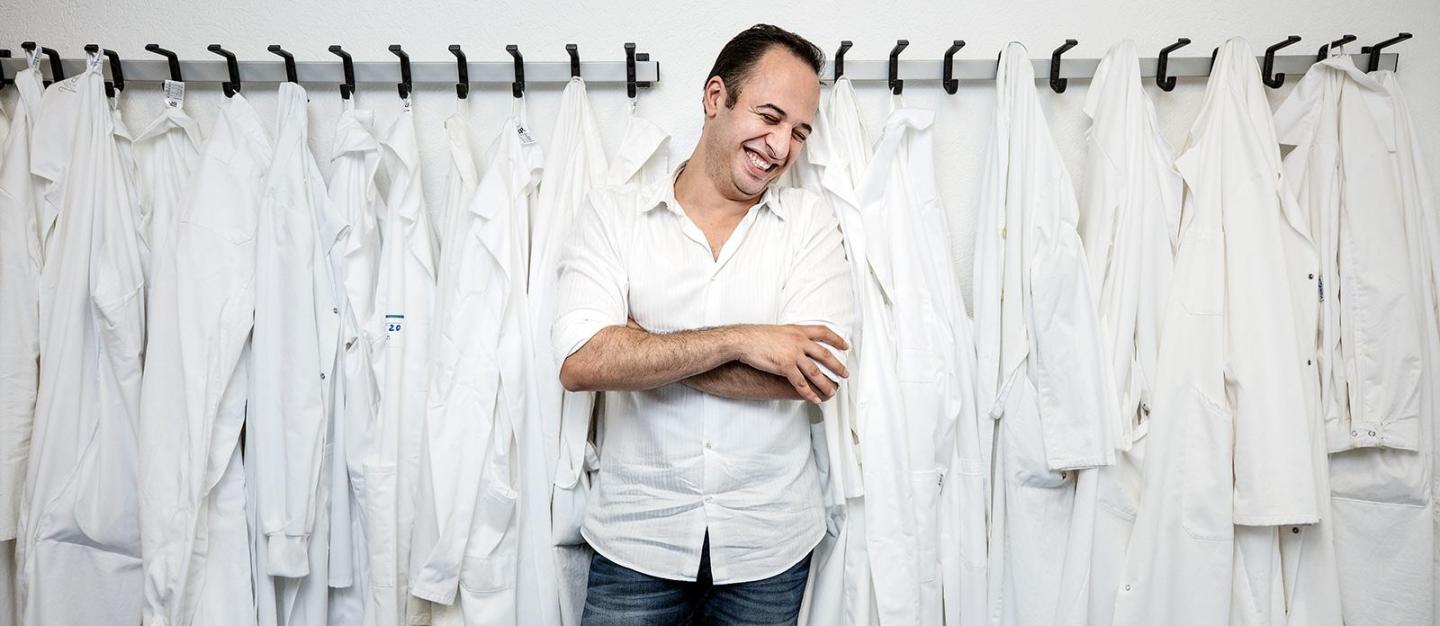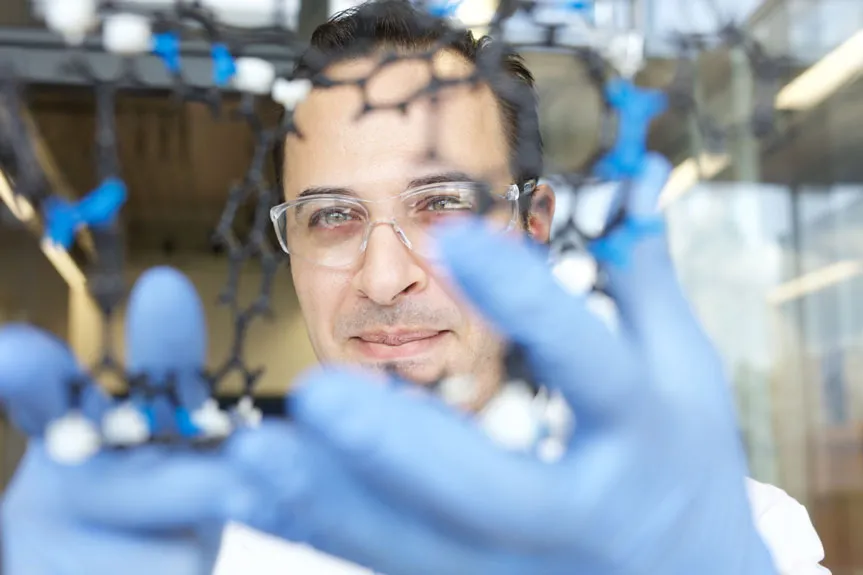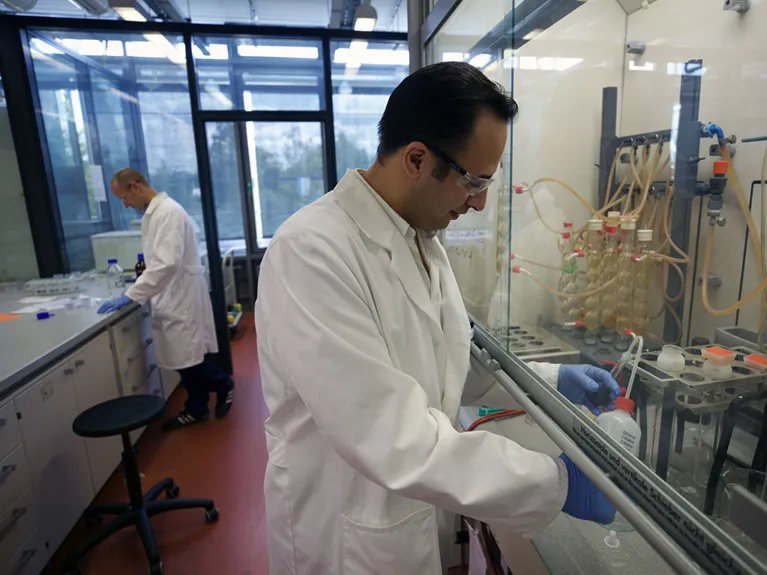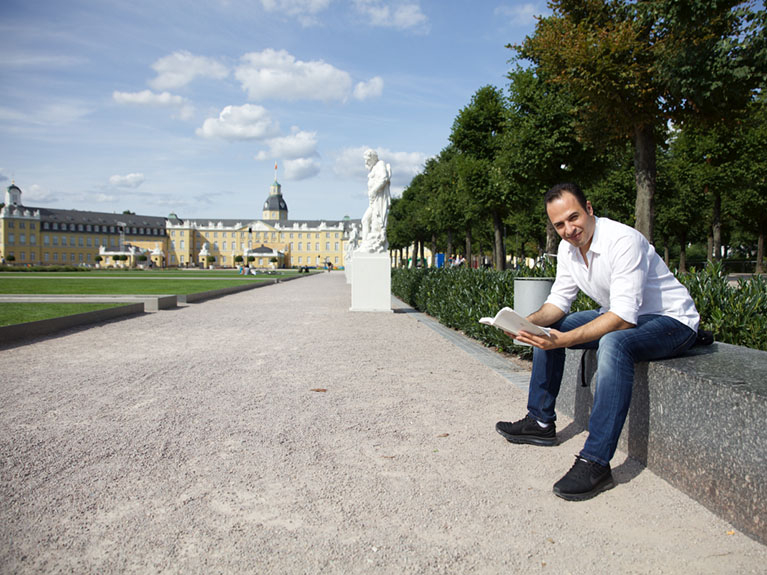
Rui Camilo für VolkswagenStiftung
Like Winning the Lottery
About a chemist from Syria, who fled his country in search of peace – and found a little piece of home at the Karlsruhe Institute of Technology: A true story with an almost perfect happy ending.
Happiness came as a pre-Christmas gift. "I remember exactly," says Anemar Bruno Kanj. The chemist who escaped from Syria – jeans, sneakers, bright eyes and a captivating smile – was traveling with his cousin in Strasbourg one day before Christmas Eve when his cell phone rang.
The call came from the Karlsruhe Institute of Technology (KIT): Bruno, as the Syrian wants to be called in Germany, could start work on his Ph.D. thesis at KIT in January 2017. "I danced in the street for joy," he says.
How did it come about? "It was pure coincidence," he says. A friend of his had contact with a friend of KIT researcher Dr. Lars Heinke, who was looking for doctoral candidate in the field of chemistry. An initial meeting was agreed. "Bruno liked the KIT, and we liked Bruno," says Heinke. Together, they wrote the application for an additional position in an already ongoing project funded by the Volkswagen Foundation – and were successful. The Foundation's Refugee Researcher program made it all possible.

In the lab: Anemar Bruno Kanj with his colleague Lars Heinke

Kanj with atom model
The research group at KIT soon became Kanjs’ center of life. He’s often there into the late hours of the evening. He works with materials that could sometime in the future serve in as miniature machines, remotely controlled by light. These "organometallic scaffold structures" or MOFs (Metal Organic Frameworks) have a three-dimensional skeleton of carbon chains and "metal nodes" reminiscent of the skeleton of an apartment building. "The topic has been booming for many years," reports project leader Heinke. In the tailored pores of the MOFs, for example, gases can be stored in large quantities, such as methane for fuel cells or the greenhouse gas carbon dioxide.
The Karlsruhe researchers, however, have something else in mind. They coat the MOFs with molecular appendages that change their structure when exposed to visible light of a particular wavelength. The movable components can open and close like barn doors, stretch or contract, and switch on and off. Cleverly combined, this can result in nanometer-sized pumps, production lines and even particles that move as if on legs. The scientists have already produced membranes that when light-controlled allow only certain molecules in adjustable amounts to pass through.
Kanj tests the quality of the materials and what is actually happening when they are exposed to light. "We have already had some success," he reveals. One of the next goals is to connect thousands of treated molecules in such a way that they develop forces in the Newtonian range and their movements can be recognized under a light microscope. The researchers are not primarily concerned with concrete applications. They primarily want to show what could be possible with the ground-breaking technique.

MOF membranes in a five-cent-coin format.
When Kanj, Heinke and Kai Müller, the third in the MOF team, talk shop in the office, they speak English. For one thing, because Kanj could not complete his full-time German course because of the new job and, secondly, because at KIT English is a kind of official language anyway. A lot of the researchers there come from abroad, for example from India, China and Egypt. Kanj likes that. "It's quite stimulating to be able to learn so much from other cultures."

The KIT lab is like a little piece of home for Anemar Bruno Kanj.
The chemist feels most comfortable when working in the laboratory. "It's like a piece of home for me," he says. As a student at Al Baath University in Homs, Syria, he also spent a lot of time in the lab researching for his undergraduate and master theses, and finally leading a four-person student team. But the war was always present. Twice, grenades struck the university – fortunately no one was injured. The center of Homs, though, was already largely in ruins and many people were killed.
It was therefore out of the question for Kanj to stay there. After gaining his master's degree in applied chemistry, he fled with two friends along the so-called Balkan route in the autumn of 2015. Parts of the journey were spent crammed together with 30 or 40 other escapees in small delivery vans. In Serbia, he rode on the pillion seat of a motorbike. "But I finally made it. I was very lucky," he says. His escape, which ended in the Giessen refugee center, lasted two weeks. There was no sign of welcome culture at the time, says Kanj. "I felt quite at the mercy of the decision-makers." Giessen was followed by emergency accommodation in smaller towns, "partly with cemetery atmosphere" and always with no possibility for retreat or privacy.
Worst of all, though, was the waiting. Almost a year went by without employment, without the right to do anything. Fortunately, he was visited by his uncle, who has lived in Strasbourg since the 1960s, relates Anemar Bruno Kanj. "That’s what saved me." When his asylum application was finally approved in July 2016, he reciprocated and headed straight for Strasbourg. It was wonderful being able to be in a real home again. "To come to a family that gives you a loving welcome, that was an amazing feeling," he fondly recalls.
The Ph.D. position at KIT was then the second breakthrough. "Now it finally makes sense to have come here. I have a useful task, a job, and will most likely get a German Ph.D. That gives me confidence," he emphasizes. And Kanj likes Karlsruhe. The city reminds him of Homs before the war; not too big and not too small, "simply cozy". Almost everything is within walking distance. The weather also fits: "After all, Karlsruhe is the second-warmest city in Germany." He occupies a room in a three-student flat share. But his dream is to have his own apartment.
In the little spare time available, the chemist often goes skiing with his parents, who are currently traveling between Syria and Saudi Arabia, where his sister lives. He likes to listen to music or read books. He likes Beethoven and Handel, philosophy, the football club Real Madrid and food like his mother cooks: Syrian-Lebanese. But the dining hall food is also okay, he says. And he has discovered a fruit that tastes just as good in Germany as in Syria: Cherries. Does he want to return to Syria someday? "No, never," he says emphatically.

A strong team on ist way up: Lars Heinke, Anemar Bruno Kanj and Kai Müller (left to right)
"Even when the war is over, it will never be the country I once knew." Everything that makes up home, friends and family, no longer exists. Nevertheless, he misses his parents. "We have a very close connection. I miss them a lot," he says. It could be possible to meet up in Saudi Arabia, but as a person who has been granted asylum he has difficulty obtaining a visa for non-European countries.
Winging and complaining is not his style, though. "I still cannot believe that I am allowed to work here in Germany as a chemist," he says. He considers himself to be so lucky that he seriously thinks of playing the lottery. This could also benefit the colleagues. "If I win, I'll buy the drinks," he says.

In the palace garden in Karlsruhe
